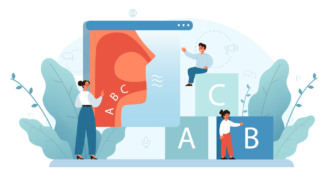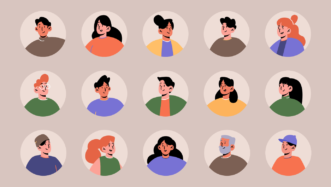LESSON OVERVIEW
The main objectives of this advanced lesson on friendship are to:
- talk about social circles and friendship dynamics;
- watch a video about Dunbar’s number and discuss the social theory;
- reflect upon types of friendship and their challenges.
With this lesson, students discuss how they spend time with people from different groups (e.g. acquaintances, friends, loved ones, etc.), watch a video about a social theory and talk about friendship. They examine friendship situations and discuss their challenges. Students can also do an extra vocabulary activity.
60 minSpeaking ClassUnlimited Plan
This is a Speaking Class worksheet. It includes a variety of tasks that let your students practise their speaking skills. This lesson format does not focus on grammar or vocabulary. Learn more about it here.
WARM-UP
This advanced lesson on friendship starts with a warm-up where students look at different relationships and discuss how they usually spend time with each person. At this point in the lesson, you can ask students to do an extra vocabulary activity where they match halves to complete sentences about relationships. Then, they explain what the phrases in bold mean (e.g. nurture friendships, cut out toxic friends, inner and outer circles, etc.).
VIDEO AND DISCUSSION
After the warm-up, students watch a video about Dunbar’s number, a social theory. Before they do, students predict what ‘150 people’ in this theory means. Following that, they watch the first part of the video and say to what extent their answer was right. After that, students discuss questions about their thoughts on the video and what they expect to see next. Then, they watch the second part of the video in which they talk about circles of people in everybody’s life in detail (e.g. 5 people, 15 people, 50 people, etc.), and name one person they know in each circle. Next, they discuss questions which explore social circles and friendships.
MORE DISCUSSION
In this part of this advanced lesson on friendship, students complete statements about the topic (e.g. Friendships can/shouldn’t be based on mutual benefit.) with their opinions and give some details. After that, they analyse types of friendship (e.g. virtual friendship, childhood friendship, workplace friendship, etc.), outline an example and identify a potential challenge and benefit for each of them. Finally, students look at friendship situations (friendship imbalance, friends moving and changing interests) and answer questions about their challenges.
Subscribe to unlock these and many other Standalone lesson lesson plans with the Unlimited planWORKSHEETS













This is a great lesson!
But can you tell me why slides 4-12 are skipped in slideshow mode?
Thank you! Sure, these slides are skipped because the vocabulary activity is extra, so the lesson can be done with or without this part 🙂
Oh I see, thanks 🙂
Brilliant lesson. More like this please
Thanks, John! We’ll keep them coming 🙂
Hey Megan,
Two of my students absolutely loved this lesson. Thank you for that! Also, do you know if the TV version PDF has been uploaded?
Thanks again
Hi Dennis,
Thank you! Great to hear that your students enjoyed it. On our side, the TV version is uploaded as normal- can you contact us via chat or email us at [email protected] so we can sort that out for you? Thanks 🙂